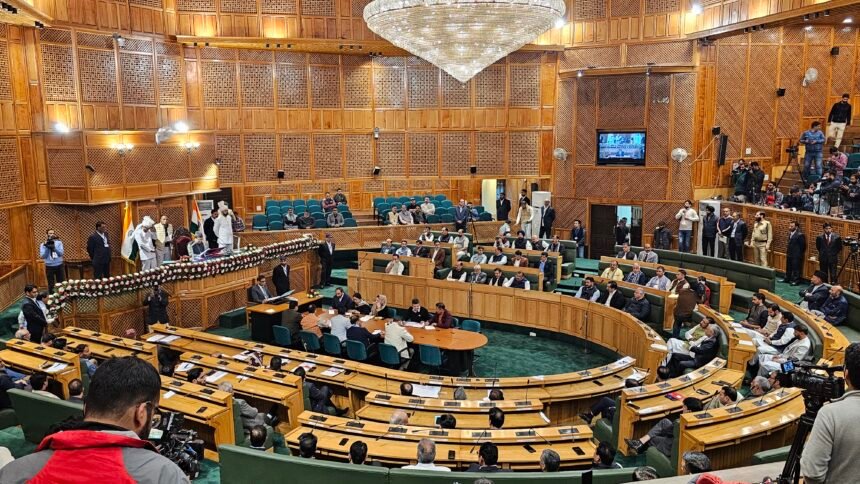Asif Iqbal Naik
Srinagar Oct 26: In a significant step towards legislative reform, the Jammu and Kashmir Legislative Assembly Secretariat has published the full text of The Jammu and Kashmir Tenancy Bill, 2025 (Bill No. 04 of 2025), along with its Statement of Objects and Reasons, in an extraordinary issue of The J&K Official Gazette on October 18, 2025.
The publication was made under Rule 64 of the Assembly’s Rules of Procedure, signaling the formal introduction of the Bill into the legislative process. It is explicitly stated that the Act “shall come into force on such date as the Government may, by notification in the Official Gazette, appoint”.
Statement of Objects and Reasons: Modernizing Tenancy Law
The Bill’s primary goal is to establish a transparent, modern, and progressive tenancy law for the Union Territory. The legislation aims to replace the existing Jammu and Kashmir (Residential and Commercial Tenancy) Act, 2012, by adopting key principles from the Model Tenancy Act circulated by the Government of India.
The three core objectives outlined in the Bill are:
1. To establish a Rent Authority to regulate the renting of premises.
2. To protect the interests of both landlords and tenants.
3. To provide a speedy adjudication mechanism for the resolution of disputes.
The government anticipates that a transparent ecosystem will encourage new investors to rent out unused properties, thereby generating employment and business opportunities.
Key Provisions in the Bill
The Bill introduces several major changes designed to formalize the rental market and ensure parity between landlords and tenants:
1. Mandatory Written Agreement and Registration
• Written Agreement: After the Bill is enacted, no premises can be let or taken on rent except through a written agreement.
• Rent Authority: The landlord and tenant must jointly inform the newly constituted Rent Authority of the executed agreement within two months.
• Proof of Tenancy: The information provided to the Rent Authority will be considered “conclusive proof of the facts relating to tenancy”.
2. Eviction and Penal Rent for Overstay
• Grounds for Eviction: A tenant can only be evicted on specific grounds approved by the Rent Court. These grounds include non-payment of rent for two consecutive months, misuse of premises (e.g., public nuisance, illegal activity, or encroachment), or if the landlord requires the premises for necessary repair/rebuilding.
• Penal Rent: If a tenant fails to vacate the premises after the tenancy agreement expires or is terminated, they are liable to pay an enhanced penal rent:
• Twice the monthly rent for the first two months.
• Four times the monthly rent thereafter until the premises are vacated.
3. Limits on Security Deposit
The Bill imposes a cap on the maximum security deposit a landlord can demand in advance:
• Residential Premises: Not to exceed two months’ rent.
• Non-Residential Premises: Not to exceed six months’ rent.
4. Protection of Essential Services
The Bill strictly prohibits a landlord or property manager from withholding any essential supply or service (which includes water, electricity, and sanitary services). In case of a violation, the Rent Authority can issue an order for immediate restoration and may award the tenant compensation of up to two months’ rent.
5. Dispute Resolution Mechanism
The new framework replaces the civil court system for tenancy disputes, establishing a tiered quasi-judicial body for fast-track dispute resolution:
• Rent Authority: To manage the registration of tenancy agreements and handle minor disputes.
• Rent Court: To handle matters of eviction and recovery of possession.
• Rent Tribunal: To function as the appellate body.
1. Legislative Status and Rationale
The Bill’s publication is a procedural step under Rule 64 of the Rules of Procedure of the J&K Legislative Assembly. This means it has been formally introduced but is not yet law. The core rationale, outlined in the Statement of Objects and Reasons, centers on two main goals:
• Modernization: To replace the outdated Jammu and Kashmir (Residential and Commercial Tenancy) Act, 2012, with a progressive and modern tenancy law aligned with national standards (the Model Tenancy Act).
• Economic Incentive: By creating a formal, transparent, and balanced ecosystem, the government hopes to encourage new investors to list their unused properties for rent. This move is projected to generate direct/indirect employment and business opportunities by stimulating the rental economy.
2. Formalizing the Agreement Process
The Bill is designed to eliminate informal, verbal, or unverified rental arrangements by mandating a structured legal process:
Mandatory Written Tenancy Agreement
The most fundamental change is that no premises can be rented out after the Act is enforced except through a written agreement. This agreement forms the legal basis of the relationship.
Registration and Conclusive Proof
Both the landlord and tenant are jointly responsible for informing the newly established Rent Authority about the agreement within two months of its execution.
• Once registered and provided with a unique identification number, the recorded information serves as “conclusive proof” of the tenancy facts. This protects both parties from later disputes regarding the rent amount, tenancy duration, or deposit details.
3. Financial Protections for Tenants
The Bill provides crucial financial safeguards, particularly regarding the upfront costs of renting:
Security Deposit Cap
The legislation explicitly limits the amount of security deposit a landlord can demand, directly addressing a common practice of demanding excessive deposits:
• Residential Premises: Deposit cannot exceed two months’ rent.
• Non-Residential (Commercial) Premises: Deposit cannot exceed six months’ rent.
Refund Mandate
The Bill mandates that the security deposit must be refunded to the tenant on the date of receiving vacant possession, after deducting any outstanding liabilities (e.g., unpaid rent, damages).
4. Eviction and Penalties: Rights and Deterrents
The law balances the landlord’s right to repossess property with the tenant’s right to secure tenure:
Grounds for Eviction
A landlord can only apply to the Rent Court for eviction on specific, justifiable grounds, which prevent arbitrary removal:
• Non-payment of rent for two consecutive months.
• Misuse of the premises (e.g., creating a public nuisance, carrying out illegal activity, or unauthorized commercial use of a residential unit).
• Requirement of the premises for necessary repair or rebuilding that cannot be carried out while the tenant is in occupation.
Punitive Penal Rent for Overstay
To severely deter tenants from holding over property after their lease expires, the Bill introduces a steep financial penalty:
• If a tenant fails to vacate after the fixed term, they must pay twice the monthly rent for the first two months.
• If the tenant still occupies the premises after two months, the penal rent escalates to four times the monthly rent until they vacate. This punitive measure empowers landlords to quickly reclaim their property.
5. Speedy Dispute Adjudication
The most innovative structural change is the creation of a specialized, three-tiered mechanism to handle tenancy disputes, removing them from the jurisdiction of slow civil courts:
This dedicated structure ensures disputes are resolved faster, which is key to boosting confidence in the rental market.
Protection of Tenant Rights
The Bill strictly prohibits any landlord or property manager from withholding essential supply or service (such as water, electricity, or sanitary services). The Rent Authority is empowered to order the immediate restoration of services and can award the tenant compensation of up to two months’ rent for the inconvenience.
Landlord’s Right of Entry
The landlord or property manager must give the tenant a minimum of twenty-four hours’ written notice before entering the premises, except in emergent situations, protecting the tenant’s right to privacy and peaceful enjoyment of the property.









